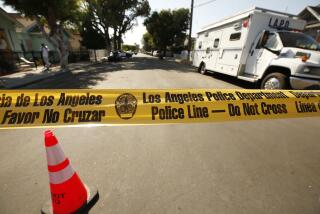LAPD reviews terror threat at bars
- Share via
The LAPD has launched a security review of the city’s bustling nightclub scene in the wake of the car-bomb incidents in London, with Chief William J. Bratton saying the department’s anti-terrorism unit needs more resources.
The LAPD began a full-scale “terror assessment” of scores of popular nightclubs around the city after terrorists parked cars filled with explosives outside a trendy bar in London.
The review includes looking at how terrorists could target clubs and other night venues as well as developing better ways to protect patrons.
“The threat has significantly expanded,” Bratton said. “Hollywood, with the highest number of nightclubs in the U.S., is a target.”
Among officials’ concerns is that scores of people often line up outside the hottest clubs, making them potential targets for a car bomb similar to the one found in London’s Haymarket area.
“We are identifying high-profile and high-volume nightclubs. We are assessing them, contacting their private security and make them more aware of what to look for that is anything unusual,” said Deputy Chief Michael Downing, head of the LAPD’s counterterrorism bureau.
Downing stressed that there was no known threat to L.A. nightclubs and that the review was being done out of an abundance of caution.
Hollywood Boulevard, Sunset Boulevard and surrounding areas have seen a boom in nightclubs and bars over the last decade as the once-struggling area has revived.
Despite the crowds, some nightclub owners questioned how serious a target their businesses could be.
Marvin Epstein, a co-owner of the nightclub Cinespace on Hollywood Boulevard, said he followed the news of the foiled bombing plot but doubted that Hollywood clubs posed as much of a risk as other targets.
“It’s not as dense a population and everyone is” in cars, he said. “It doesn’t get crowded until 11 p.m. and things close at 2 a.m. It’s a small window.”
Epstein said he welcomed the Los Angeles Police Department’s review, but thought it would do little more than give the perception that law enforcement was heightening security.
Tom Colley, a former doorman who is opening a bar off Hollywood Boulevard, was also skeptical that the neighborhood would be targeted.
“We don’t have large venues compared to other cities,” Colley said. “We have venues for 600 people. It’s not like Spain, where you have clubs for 16,000. The whole scene here is spread out. You’d find more people downtown in the middle of the day.”
Nightclubs have not appeared on any government lists of top possible terrorist targets. A 2003 list of leading targets produced by the state attorney general’s office included Los Angeles International Airport, Disneyland, the Golden Gate Bridge and the ports of Long Beach, Los Angeles, San Diego and Oakland.
The prospect of more security also concerned Colley. “It’s just going to cause more congestion than there already is,” he said.
The LAPD revealed the new effort as Bratton said the City Council needed to boost funding for the anti-terrorism unit, which he said has been hindered by understaffing and the use of temporary personnel. The bureau relies on borrowed officers for about 20% of its staff. The unit’s staffing is down about 10%.
City leaders “cannot continue to give lip service to dealing with terrorism,” Bratton said. He told the city Police Commission that L.A. remains a target for terrorist groups such as Al Qaeda.
Of the 267 officers intended to be working in counterterrorism, 44 have to be lent from other divisions because the City Council refused to pay for their permanent inclusion in the anti-terror unit, LAPD officials said.
Because those positions aren’t permanently assigned, about 21 remain unfilled
“That is 21 fewer people trying to prevent an attack,” Downing said. “We have critical infrastructure, a vibrant international community. This is where Hollywood lives. This is where the nightclubs are.”
Downing said counterterrorism analysis is not something an officer can learn overnight while on loan from a patrol division.
The number of people shifted from basic patrol to anti-terror work -- with only 9,400 officers covering 470 square miles of city -- has long been a sticky issue.
In February 2006, 73 officers were added to the unit. But Downing said a second phase that would have made the 44 borrowed officers permanent has not occurred because the City Council used the funds set aside to pay overtime.
“I share his concern and frustration.... It has not been funded,” said Councilman Jack Weiss, chairman of the council’s Public Safety Committee. “We are talking about a very small amount of dollars compared to the large amount of damage of a terrorist attack.”
richard.winton@latimes.com david.pierson@latimes.com
More to Read
Sign up for Essential California
The most important California stories and recommendations in your inbox every morning.
You may occasionally receive promotional content from the Los Angeles Times.















